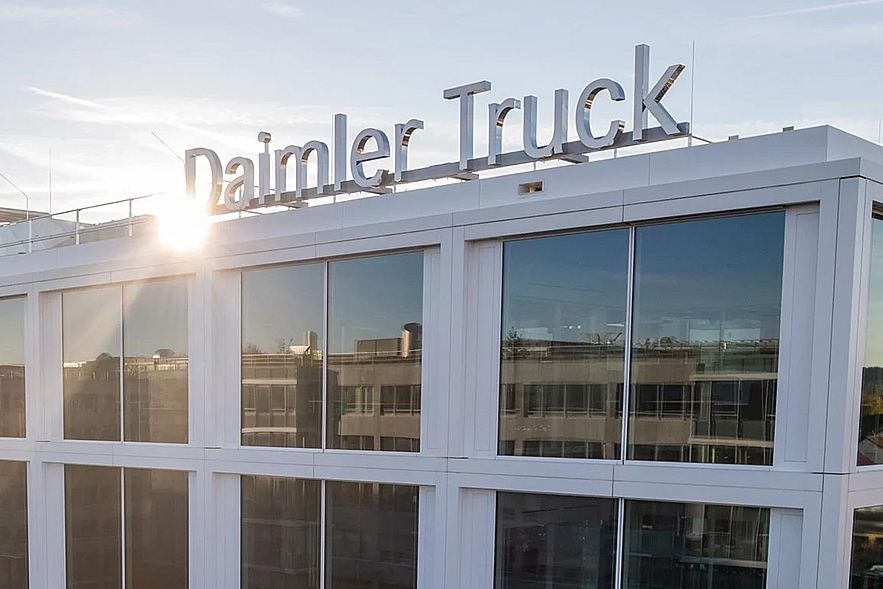Daimler Truck’s second phase of customer trials for the Mercedes-Benz GenH2 Truck arrives at a moment when heavy-duty decarbonization strategies are increasingly shaped by data from real-world operations rather than controlled test environments.
After logging more than 225,000 kilometers in its initial pilot phase, with fuel consumption ranging between 5.6 and 8.0 kg of liquid hydrogen per 100 km under varying payloads, the company is now widening the scope of its assessments with five additional partners: Hornbach, Reber Logistik, Teva Germany, Rhenus, and DHL Supply Chain.
The expansion reflects a broader industry need to validate hydrogen fuel-cell performance across diverse logistics profiles. While battery-electric trucks dominate short- and medium-distance applications, long-haul transport — with high payloads, irregular route patterns, and tight turnaround schedules — continues to test the limits of existing technologies. Daimler Truck’s move toward liquid hydrogen (sLH₂) is positioned as a technical response to these constraints, leveraging higher energy density to extend operational range and reduce refueling frequency.
Each partner company will deploy one GenH2 Truck for roughly a year, integrating the vehicles into their established logistics flows rather than constructing bespoke routes. DHL Supply Chain plans to pair the truck with its fully electric refrigerated trailer on routes across Baden-Württemberg, Hesse, and North Rhine-Westphalia — a combination designed to test system-level compatibility between zero-carbon technologies. This setup will place additional load on the truck’s fuel-cell system, offering insight into performance under temperature-controlled freight conditions, a segment where energy demand is notably higher.
Teva Germany, operating under the ratiopharm brand, will use the truck in national long-haul pharmaceutical distribution. With stringent timing requirements and temperature-sensitive cargo, pharmaceutical logistics add operational discipline that could expose potential limitations in refueling availability or vehicle planning. Currently, the GenH2 refuels exclusively at dedicated sLH₂ stations in Woerth am Rhein and Duisburg — a constraint that Reber Logistik highlights directly, deploying the truck only in regions with viable refueling access. This underscores an industry-wide challenge: early hydrogen truck adoption remains closely tied to localized infrastructure readiness.
Hornbach and Rhenus bring different testing parameters. Hornbach will apply the fuel-cell truck to its recyclable materials fleet, a long-haul operation that stresses payload capacity and continuous route reliability. Rhenus, operating from its Duisburg logistics hub, will test whether hydrogen power can be effectively integrated into an international cargo network where efficiency and regional interoperability are central benchmarks.
Assessing Performance Against Diesel Standards
Daimler Truck emphasizes that the GenH2 Truck aims to match the long-distance capability of diesel tractors — a baseline that heavy-duty decarbonization must ultimately meet. The vehicle’s 300 kW continuous fuel-cell output, supported by a buffer battery for peak loads and regenerative braking, positions it as a technical contender for high-demand corridors. Its 40-ton gross vehicle weight and roughly 25-ton payload capacity align with existing diesel norms, suggesting that operational adjustments for fleet operators could remain minimal if hydrogen supply constraints are resolved.
Real-world consumption data from the first testing phase — averaging at a level competitive with expectations for fuel-cell long-haul systems — will now be evaluated under more diverse transport profiles. These insights are intended to guide final design decisions for the truck’s series-production variant and inform parallel development of sales and service structures.
While infrastructure limitations continue to shape deployment strategy, Daimler Truck is already moving toward commercialization. A small-series production run of 100 GenH2 tractor units is planned for late 2026, marking the company’s first structured step toward market-ready fuel-cell long-haul vehicles. The timing places Daimler among the early movers in the European hydrogen truck landscape, though the ability to scale will depend heavily on coordinated expansion of sLH₂ refueling networks — an area where industry progress remains uneven.
As the second phase of testing unfolds, the trial partners will generate critical data on vehicle reliability, refueling logistics, operational economics, and driver experience.
Stay updated on the latest in energy! Follow us on LinkedIn, Facebook, and X for real-time news and insights. Don’t miss out on exclusive interviews and webinars—subscribe to our YouTube channel today! Join our community and be part of the conversation shaping the future of energy.
